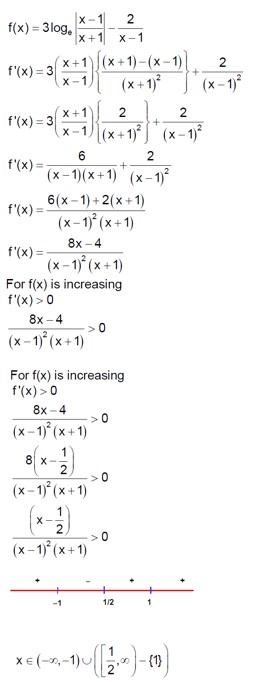Let f: [-π/4, π/4] → R be defined as
f(x) = { (1 + |sin x|)³ᵃ/|sin x|, -π/4 < x < 0; b, x = 0; e^(cot 4x / cot 2x), 0 < x < π/4 }
If f is continuous at x = 0, then the value of 6a + b² is equal to:
Let f: [-π/4, π/4] → R be defined as
f(x) = { (1 + |sin x|)³ᵃ/|sin x|, -π/4 < x < 0; b, x = 0; e^(cot 4x / cot 2x), 0 < x < π/4 }
If f is continuous at x = 0, then the value of 6a + b² is equal to:
Option 1 -
1 - e
Option 2 -
e
Option 3 -
1 + e
Option 4 -
e - 1
-
1 Answer
-
Correct Option - 3
Detailed Solution:L.H.L = lim (x→0? ) (1 + |sin x|)³? /|sin x| = lim (h→0) (1 + sinh)³? /sinh = e³?
R.H.L = lim (x→0? ) e^ (cot 4x / cot 2x) = lim (x→0? ) e^ (tan 2x / tan 4x) = e¹/².
f (0) = b.
For continuity, e³? = e¹/² = b.
3a = 1/2 ⇒ a = 1/6. b = e¹/².
6a + b² = 6 (1/6) + (e¹/²)² = 1 + e
Similar Questions for you
f (x) is an even function
So, f (x) has at least four roots in (-2, 2)
So, g (x) has at least two roots in (-2, 2)
now number of roots of f (x)
It is same as number of roots of will have atleast 4 roots in (-2, 2)
Let
So, f(x) = x
Now,
f(x) = αx – b
option (D) satisfies
f (x) = f (6 – x) Þ f' (x) = -f' (6 – x) …. (1)
put x = 0, 2, 5
f' (0) = f' (6) = f' (2) = f' (4) = f' (5) = f' (1) = 0
and from equation (1) we get f' (3) = -f' (3)
So f' (x) = 0 has minimum 7 roots in
h (x) = f' (x) . f' (x)
h' (x) = (f' (x)2 + f' (x) f' (x)
h (x) = 0 has 13 roots in x
h' (x) = 0 has 12 roots in x
1 + x? - x? = a? (1+x)? + a? (1+x) + a? (1+x)² . + a? (1+x)?
Differentiate
4x³ - 5x? = a? + 2a? (1+x) + 3a? (1+x)².
12x² - 20x³ = 2a? + 6a? (1+x).
Put x = -1
12 + 20 = 2a? ⇒ a? = 16
Taking an Exam? Selecting a College?
Get authentic answers from experts, students and alumni that you won't find anywhere else
Sign Up on ShikshaOn Shiksha, get access to
- 66k Colleges
- 1.2k Exams
- 681k Reviews
- 1800k Answers

